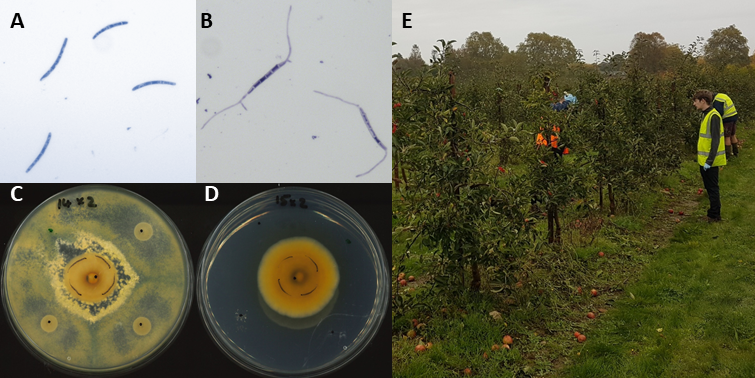Please click here to access the main AHDB website and other sectors.
SCEPTREplus: Potential new hope for apple canker control
Monday, 1 March 2021
An integrated approach using biocontrol agents with new fungicides and plant extracts could be the future of apple canker control, explains Matevz Papp-Rupar, NIAB EMR.
Apple canker is a devastating disease caused by an opportunistic fungal pathogen, Neonectria ditissima. Integrated cultural and chemical control practices are required for control.
Pruning out cankers as often as possible is very effective but also labour-intensive and thus often cost-prohibitive. All infected material should be removed from the orchard and burned to reduce disease pressure. Copper- and tebuconazole-based products were used in the past to protect leaf scars during the leaf fall, which is the most important infection period in the majority of cultivars grown in the UK. Both copper and tebuconazole products are no longer authorised for use in apple. New protection products are therefore urgently needed.
Research results
In this study, we have selected 15 plant protection products that are close to UK market and have shown activity against other fungal diseases.
We tested to see if the products can:
- Stop apple canker spores from germinating
- Slow down apple canker growth on agar plates
We are pleased to report that eight products significantly reduced spore germination, fungal growth, or both. The products were as follows:
- Three Bacillus-based biocontrol agents
- One Trichoderma-based biocontrol agent
- Three synthetic fungicides
- One plant extract
These products are currently being tested in a full-scale orchard trial in a highly infected orchard to test leaf-scar and pruning-wound protection.
The efficacy will be assessed in April 2021 and we will share our findings soon afterwards.
It is possible that an integrated approach using biocontrol agents in combination with new fungicides and plant extracts will be required for sustainable and effective control of apple canker in the future.
What is apple canker?
Apple canker can infect petal scars, leaf scars, picking and pruning wounds, causing post-harvest fruit rot. It also causes cankers that reduce yield and quality on mature trees and can girdle and kill young trees. Cankers can produce spores and infect throughout the year. A great majority of commercial apple cultivars are highly susceptible.

Laboratory assays (A–D) and orchard trial set-up (E). Test product reducing spore germination (A) and growth on the agar plate (C) in comparison with water control (B and D) are shown


